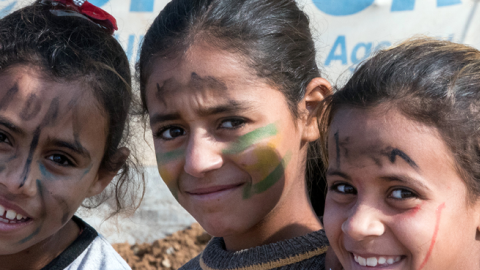Is ISIS – also known as Daesh – about to be soundly defeated? On Mar. 18, CBS reported, “The battle for the last scrap of land held by the Islamic State (ISIS) in Syria has taken longer than expected, with the terror group vowing to fight to the last man in Baghouz….”
Thankfully, all indications are that the battle in Baghouz is virtually over.
Still, in a meeting I recently attended (more about that below), a hopeful participant heralded the ultimate defeat of ISIS, and a gentleman with decades of experience in international affairs responded. He soberly pointed out that, even after the surviving jihadis are finally pushed out of Baghouz, at least 30,000 ISIS loyalists are already scattered across the map, eager to reorganize and redeploy.
Since mid-2014, during and following the ISIS invaders’ sweep of violence across the region, the group left behind unimaginable forebodings of danger, particularly among Iraq and Syria’s religious minorities. Worse, as ISIS passed through, they spelled out their diabolical agenda in a stunning array of hidden explosives, demolished buildings, bloodied handprints and unholy slogans smeared on homes, temples and churches, and innumerable mass graves.
At the same time, other terrorist outfits like al-Shaab and Boko Haram have sworn allegiance to ISIS, extending the group’s long arm of terror well beyond Iraq and Syria. Attacks in Egypt, Libya, Africa, Asia, Northern Europe and even the United States, including mass shootings, stabbings and vehicular assaults have been credited to ISIS followers.
Although religious minorities in war-torn Iraq, including Christians, Yazidis and others, had suffered devastating losses, after the 2016 UN genocide declaration, hopes were raised that wrongs would soon be made right. But, in fact, the communities that were victimized by ISIS remain broken in a number of ways, and nearly beyond repair.
In the meeting I attended at Hudson Institute, Haider Elias, President of Yazda – a global Yazidi organization – calmly and clearly laid out the facts faced by his people. Sinjar District, the center of Yazidi life in Iraq, had a population in late 2013 of around 100,000. Only some 25,000 have returned, mostly to the north of Sinjar. The number of dead or abducted by ISIS was estimated around 10,000 in 2017; today the death toll remains unclear.
Those Yazidis who attempted to return to southern Sinjar found it in ruins. Even if a house or workplace could be renovated, the area’s basic infrastructure remains in disrepair, while numerous roadblocks operated by conflicting forces prevent unrestricted travel. There are few jobs, no healthcare, no schools or teachers and – perhaps most frightening – no trustworthy security.
Sinjar is close to the borders of Iraqi Kurdistan, Iran and Turkey. And the military forces who are present in the area are not trusted by the Yazidi population. The returnees are deeply traumatized by the horrors they’ve experienced. Many saw their loved ones viciously murdered; young women were raped, abducted and sold as sex slaves to multiple owners.
And, although their Christian neighbors are struggling, there is even less global response to the plight of the Yazidis, who have a very small diaspora worldwide. The 2018 Nobel Prize winner, Nadia Murad, remains the best-known champion of her Yazidi people. A former ISIS slave and rape victim herself, she speaks with a powerful clarity about the suffering thousands of Yazidis have endured.
In the largely Christian region farther south, some homes, churches and schools are slowly being rebuilt, and small business are getting started, thanks to international Christian NGOs and USAID funding. The work is slow, and the challenges are overwhelming. As with the Yazidi people, fear and remembrance of 2014’s horrors are never far away.
Also, as with the Yazidis, security is a grave concern. As I recently wrote for Jerusalem Post
On Feb. 18, Asia News reported, “There is no peace for Christians in northern Iraq…The epicenter of this new chapter of anti-Christian persecution is Bartella, increasingly draped with banners depicting the militia battles against Isis as well as saints and sacred figures of the Shiite tradition….”
The major Christian towns of Qaraqosh, Bartella and Karamles are now supposedly under the control of the Iraqi army, but the military force that is actually occupying them, is an Iran-funded Shia militia. In fact, my colleague Michael Pregent, military intelligence analyst at Hudson Institute, reports that it is under the command of Iran’s Quds extraterritorial force and its infamous general, Qasem Soleimani.
Iran is certainly an ambitious and lethal force to be reckoned with, as Israel’s Prime Minister Netanyahu and America’s President Trump have repeatedly warned.
In the meantime, short of divine intervention, it is unlikely that ISIS will be utterly decimated following their last Syrian standoff. Military analysts largely agree that hundreds of battle-hardened fighters – with or without their self-declared “caliph” al-Baghdadi – are already in search of formidable redoubts, readying themselves for the next battle.
An <i>Atlantic</i> article by Simon Cottee offers a more optimistic view: “No doubt it’s true that ISIS has some life left in it. Journalists and experts ought to counter Trump’s bombastic rhetoric that “we have defeated ISIS” and point out nuances and complexity in the ongoing fight against the group. But they are also under an obligation to concede the glaringly obvious: ISIS will not be able to replicate the scale of violence and chaos it unleashed when it had large areas of land and all the resources and potential income that went with it. …”
Whether or not ISIS’s perverse future intentions fail to materialize, their brutal legacy will live on for generations in the shattered lives and recurring nightmares of their victims. And truthfully, in the aftermath of ISIS, help and hope are in very short supply.
Nonetheless, there are optimistic and grateful survivors. There are visionary NGOs. And there are people of faith, generosity and fortitude who will help the genocide’s survivors in every way they can.
May we be among them.

















